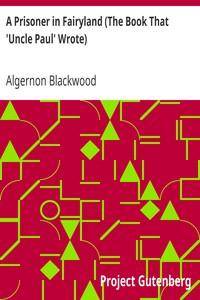Read this ebook for free! No credit card needed, absolutely nothing to pay.
Words: 71471 in 26 pages
This is an ebook sharing website. You can read the uploaded ebooks for free here. No credit cards needed, nothing to pay. If you want to own a digital copy of the ebook, or want to read offline with your favorite ebook-reader, then you can choose to buy and download the ebook.
CATHARINE FURZE
It was a bright, hot, August Saturday in the market town of Eastthorpe, in the eastern Midlands, in the year 1840. Eastthorpe lay about five miles on the western side of the Fens, in a very level country on the banks of a river, broad and deep, but with only just sufficient fall to enable its long-lingering waters to reach the sea. It was an ancient market town, with a six-arched stone bridge, and with a High Street from which three or four smaller and narrower streets connected by courts and alleys diverged at right angles. In the middle of the town was the church, an immense building, big enough to hold half Eastthorpe, and celebrated for its beautiful spire and its peal of eight bells. Round the church lay the churchyard, fringed with huge elms, and in the Abbey Close, as it was called, which was the outer girdle of the churchyard on three sides, the fourth side of the square being the High Street, there lived in 1840 the principal doctor, the lawyer, the parson, and two aged gentlewomen with some property, who were daughters of one of the former partners in the bank, had been born in Eastthorpe, and had scarcely ever quitted it. Here also were a young ladies' seminary and an ancient grammar school for the education of forty boys, sons of freemen of the town. The houses in the Close were not of the same class as the rest; they were mostly old red brick, with white sashes, and they all had gardens, long, narrow, and shady, which, on the south side of the Close, ran down to the river. One of these houses was even older, black-timbered, gabled, plastered, the sole remains, saving the church, of Eastthorpe as it was in the reign of Henry the Eighth.
Just beyond the church, going from the bridge, the High Street was so wide that the houses on either side were separated by a space of over two hundred feet. This elongated space was the market-place. In the centre was the Moot Hall, a quaint little building, supported on oak pillars, and in the shelter underneath the farmers assembled on market day. All round the Moot Hall, and extending far up and down the street, were cattle-pens and sheep-pens, which were never removed. Most of the shops were still bow-windowed, with small panes of glass, but the first innovation, indicative of the new era at hand, had just been made. The druggist, as a man of science and advanced ideas, had replaced his bow- window with plate-glass, had put a cornice over it, had stuccoed his bricks, and had erected a kind of balustrade of stucco, so as to hide as much as possible the attic windows, which looked over, meekly protesting. Nearly opposite the Moot Hall was the Bell Inn, the principal inn in the town. There were other inns, respectable enough, such as the Bull, a little higher up, patronised by the smaller commercial travellers and farmers, but the entrance passage to the Bull had sand on the floor, and carriers made it a house of call. To the Bell the two coaches came which went through Eastthorpe, and there they changed horses. Both the Bull and the Bell had market dinners, but at the Bell the charge was three-and- sixpence; sherry was often drunk, and there the steward to the Honourable Mr. Eaton, the principal landowner, always met the tenants. The Bell was Tory and the Bull was Whig, but no stranger of respectability, Whig or Tory, visiting Eastthorpe could possibly hesitate about going to the Bell, with its large gilded device projecting over the pathway, with its broad archway at the side always freshly gravelled, and its handsome balcony on the first floor, from which the Tory county candidates, during election times, addressed the free and independent electors and cattle.
Eastthorpe was a malting town, and down by the water were two or three large malthouses. The view from the bridge was not particularly picturesque, but it was pleasant, especially in summer, when the wind was south-west. The malthouses and their cowls, the wharves and the gaily painted sailing barges alongside, the fringe of slanting willows turning the silver-gray sides of their foliage towards the breeze, the island in the middle of the river with bigger willows, the large expanse of sky, the soft clouds distinct in form almost to the far distant horizon, and, looking eastwards, the illimitable distance towards the fens and the sea--all this made up a landscape, more suitable perhaps to some persons than rock or waterfall, although no picture had ever been painted of it, and nobody had ever come to see it.
Such was Eastthorpe. For hundreds of years had the shadow of St. Mary's swept slowly over the roofs underneath it, and, of all those years, scarcely a line of its history survived, save what was written in the churchyard or in the church registers. The town had stood for the Parliament in the days of the Civil War, and there had been a skirmish in the place; but who fought in it, who were killed in it, and what the result was, nobody knew. Half a dozen old skulls of much earlier date and of great size were once found in a gravel pit two miles away, and were the subject of much talk, some taking them for Romans, some for Britons, some for Saxons, and some for Danes. As it was impossible to be sure if they were Christian, they could not be put in consecrated ground; they were therefore included in an auction of dead and live stock, and were bought by the doctor. Surnames survived in Eastthorpe with singular pertinacity, for it was remote from the world, but what was the relationship between the scores of Thaxtons, for example, whose deaths were inscribed on the tombstones, some of them all awry and weather-worn, and the Thaxtons of 1840, no living Thaxton could tell, every spiritual trace of them having disappeared more utterly than their bones. Their bones, indeed, did not disappear, and were a source of much trouble to the sexton, for in digging a new grave they came up to the surface in quantities, and had to be shovelled in and covered up again, so that the bodily remains of successive generations were jumbled together, and Puritan and Georgian Thaxtons were mixed promiscuously with their descendants. Nevertheless, Eastthorpe had really had a history. It had known victory and defeat, love, hatred, intrigue, hope, despair, and all the passions, just as Elizabeth, King Charles, Cromwell, and Queen Anne knew them, but they were not recorded.
It was a bright, hot, August Saturday, as we have said, and it was market day. Furthermore, it was half-past two in the afternoon, and the guests at Mr. Furze's had just finished their dinner. Mr. Furze was the largest ironmonger in Eastthorpe, and sold not only ironmongery, but ploughs and all kinds of agricultural implements. At the back of the shop was a small foundry where all the foundry work for miles round Eastthorpe was done. It was Mr. Furze's practice always to keep a kind of open house on Saturday, and on this particular day, at half-past two, Mr. Bellamy, Mr. Chandler, Mr. Gosford, and Mr. Furze were drinking their whiskey-and-water and smoking their pipes in Mr. Furze's parlour. The first three were well-to-do farmers, and with them the whiskey-and-water was not a pretence. Mr. Furze was a tradesman, and of a different build. Strong tobacco and whiskey at that hour and in that heat were rather too much for him, and he played with his pipe and drank very slowly. The conversation had subsided for a while under the influence of the beef, Yorkshire pudding, beer, and spirits, when Mr. Bellamy observed--
"Old Bartlett's widow still a-livin' up at the Croft?"
"Yes," said Mr. Gosford, after filling his pipe again and pausing for at least a minute, "Bartlett's dead."
"Bartlett wur a slow-coach," observed Mr. Chandler, after another pause of a minute, "so wur his mare. I mind me I wur behind his mare about five years ago last Michaelmas, and I wur well-nigh perished. I wur a- goin' to give her a poke with my stick, and old Bartlett says, 'Doan't hit her, doan't hit her; yer can't alter her.'"
The three worthy farmers roared with laughter, Mr. Furze smiling gently.
"That was a good 'un," said Mr. Bellamy.
"Ah," replied Chandler, "I mind that as well as if it wur yesterday."
Free books android app tbrJar TBR JAR Read Free books online gutenberg
More posts by @FreeBooks

: Stories by Foreign Authors: German — Volume 2 by Auerbach Berthold Contributor Chamisso Adelbert Von Contributor Hauff Wilhelm Contributor Kompert Leopold Contributor - Short stories German Translations into English Germany


: A Prisoner in Fairyland (The Book That 'Uncle Paul' Wrote) by Blackwood Algernon - Voyages and travels Fiction; Magic Fiction






